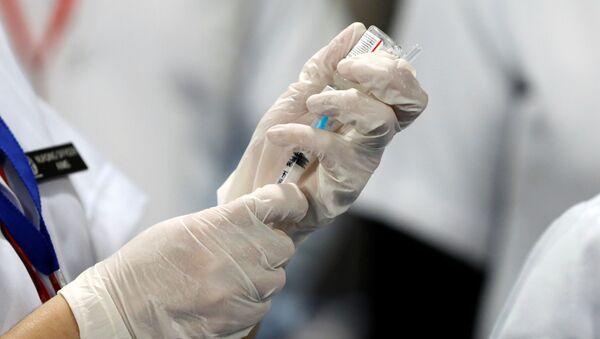Since the kick-start of the COVID-19-vaccination drive in India, referred to as the world’s biggest programme to immunise more than 1.3 billion people, there has been some sort of relief and hope in people to soon return to normal.
However, there have been many concerns among people about side effects of the vaccination, as out of a total of 224,301 beneficiaries have been were vaccinated in the two-day vaccination programme, 447 cases have shown signs of side effects, with three individuals being hospitalised.
We've started the world's #LargestVaccineDrive & we are very confident that it will be a smooth program & we will be able to vaccinate a very significant number of citizens. It is the beginning of the end of the pandemic: AIIMS Director Dr. Randeep Guleria pic.twitter.com/Tj5z5umtrE
— DD India (@DDIndialive) January 16, 2021
Randeep Guleria, who is the director of the All India Institute of Medical Science (AIIMS) where the first dose was administered to a health worker, talks to Sputnik about how the vaccination programme will unfold in the coming months, as well as about cases of side effects and the many other challenges involved.
Sputnik: India has launched the world’s biggest COVID-19 vaccination programmes to immunise more than 1.3 billion people. What does this mean for the country?
Dr Guleria: It’s a historic moment for the country. I think we are moving into the final phase of the pandemic. It is the beginning of its end.
In the first phase that will go on till March 2021, we aim to vaccinate nearly 30 million Indian healthcare and frontline workers with Covishield or Covaxin. Then we will move on to the senior citizens and people above 50 years of age.
The aim is to decrease the mortality rate and vaccinate the elderly people as they will have more serious diseases and less immunity. Also, to have enough people vaccinated so that we get good herd immunity to break the chain of transmission.
Sputnik: You are one of the volunteers who got the COVID-19 vaccination on day one. How did you feel and did you experience any side effects?
Dr Guleria: I am perfectly alright and experienced no fever, body ache, or any pain at the sight of the injection.
#LargestVaccineDrive
— Ministry of Health (@MoHFW_INDIA) January 16, 2021
Dr. Randeep Guleria, Director - @aiims_newdelhi takes the jab. pic.twitter.com/3gXdXy50X9
Sputnik: A total of 447 cases of side effects have been reported in the two-day vaccination drive, out of which three individuals were hospitalised. This has raised many concerns among people about the efficacy of the vaccination.
Dr Guleria: Some might experience minor fever, body ache, or pain at the sight of the reaction, but one should not be worried about side effects. It’s basically getting the immune system activated for antibodies. There were less than 10% chances of one getting minor reactions and it is important to report to the doctors so that we can monitor regularly.
A very small number may have more serious adverse effects. One of them is Anaphylaxis, which is an allergic reaction that got caught by one of our security guards at AIIMS at the fag end of the vaccination on day one and was hospitalised. Within a few minutes of the vaccination, he developed a skin rash, headache, and palpitation which got settled on treatment.
Sputnik: How are we going to cover the 1.3 billion people of India for COVID-19 vaccination?
Dr Guleria: It’s a big challenge to cover so many people at the earliest. It largely depends on the number of vaccination dosages available. One person would need two shots of dosage between 4-6 weeks of the vaccination. Both Covishield and Covaxin are being used in bulk and the companies would ramp up the production to provide more and more doses.
One is hopeful that by March, the Sputnik V vaccine and Zydus Cadila vaccine, which are in third phase trial, will also get approval and that will allow us a larger pool of vaccines that we can give out. People need to understand that it’s not a pick and choose situation. Whatever best we get, we will have to make use of it.
Sputnik: On day two of the vaccination drive, many states in India had to put the vaccination programme on hold due to a technical glitch with the CoWin (Covid Vaccine Intelligence Network) app. How are we going to face this challenge?
Dr Guleria: There are going to be glitches because a large number of people’s databases are being uploaded on the CoWin app through which the selection of the candidate for vaccination will be monitored. But I’m confident that it’ll be resolved.
The CoWin app has to be made robust to be able to keep everyone’s record, notify people whenever their turn comes, which healthcare centre to go to for the vaccination and when to return for the second shot of the dosage.



